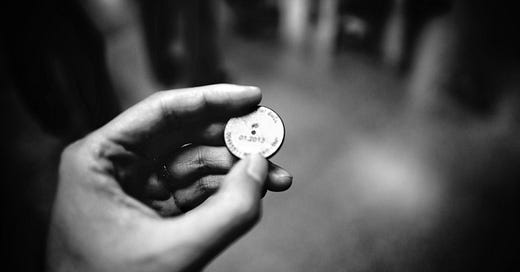God asks us to give everything we have. And why not? God gave us everything in the first place.
Reading I
1 Kgs 17:10-16
In those days, Elijah the prophet went to Zarephath. As he arrived at the entrance of the city, a widow was gathering sticks there; he called out to her, "Please bring me a small cupful of water to drink."
She left to get it, and he called out after her, "Please bring along a bit of bread."
She answered, "As the LORD, your God, lives, I have nothing baked; there is only a handful of flour in my jar and a little oil in my jug. Just now I was collecting a couple of sticks, to go in and prepare something for myself and my son; when we have eaten it, we shall die."
Elijah said to her, "Do not be afraid. Go and do as you propose. But first make me a little cake and bring it to me. Then you can prepare something for yourself and your son. For the LORD, the God of Israel, says, 'The jar of flour shall not go empty, nor the jug of oil run dry, until the day when the LORD sends rain upon the earth.'"
She left and did as Elijah had said. She was able to eat for a year, and he and her son as well; the jar of flour did not go empty, nor the jug of oil run dry, as the LORD had foretold through Elijah.
When we give, we will receive back. It’s a truth so fundamental to life that most world religions acknowledge it in some for or other, as divine providence or karma or what have you.
It won’t always be as direct or immediate as the widow saw, but it invariably happens. The tighter we tighten our fists, the more falls out between our fingers. But if we let it go generously, it will come back at us.
So be careful what we put out into the world.
Responsorial Psalm
Ps 146:7, 8-9, 9-10
R. (1b) Praise the Lord, my soul!
The LORD keeps faith forever,
secures justice for the oppressed,
gives food to the hungry.
The LORD sets captives free.
R. Praise the Lord, my soul!
The LORD gives sight to the blind.
The LORD raises up those who were bowed down;
the LORD loves the just.
The LORD protects strangers.
R. Praise the Lord, my soul!
The fatherless and the widow he sustains,
but the way of the wicked he thwarts.
The LORD shall reign forever;
your God, O Zion, through all generations. Alleluia.
R. Praise the Lord, my soul!
This song, which begins the closing the Psalter, is sung by someone who has learned they have no other source of strength except God. Many people suffer, many have lost a lot over the course of their lives. But like the widow in the first reading, we can still continue with faith in God, and in the hope that He will sustain us.
Reading II
Heb 9:24-28
Christ did not enter into a sanctuary made by hands, a copy of the true one, but heaven itself, that he might now appear before God on our behalf. Not that he might offer himself repeatedly, as the high priest enters each year into the sanctuary with blood that is not his own; if that were so, he would have had to suffer repeatedly from the foundation of the world.
But now once for all he has appeared at the end of the ages to take away sin by his sacrifice. Just as it is appointed that human beings die once, and after this the judgment, so also Christ, offered once to take away the sins of many, will appear a second time, not to take away sin but to bring salvation to those who eagerly await him.
This passage reiterates much of what we heard last Sunday. Jesus sacrificed Himself for our sins, but it’s not an imperfect sacrifice, like the Israelites did with animals at the temple. Jesus gave everything, including His life, for us. That’s the model we’re meant to follow.
Alleluia
Mt 5:3
R. Alleluia, alleluia.
Blessed are the poor in spirit,
for theirs is the kingdom of heaven.
R. Alleluia, alleluia.
One doesn’t have to be literally poor to recognize our dependence on God.
Gospel
Mk 12:38-44
In the course of his teaching Jesus said to the crowds, "Beware of the scribes, who like to go around in long robes and accept greetings in the marketplaces, seats of honor in synagogues, and places of honor at banquets. They devour the houses of widows and, as a pretext recite lengthy prayers. They will receive a very severe condemnation."
He sat down opposite the treasury and observed how the crowd put money into the treasury. Many rich people put in large sums. A poor widow also came and put in two small coins worth a few cents. Calling his disciples to himself, he said to them, "Amen, I say to you, this poor widow put in more than all the other contributors to the treasury. For they have all contributed from their surplus wealth, but she, from her poverty, has contributed all she had, her whole livelihood."
The Pharisees often believed themselves to be superior to others, including the poor. In fact, they would take advantage of widows’ hospitality simply to make an ostentatious display of their prayers.
Notice the contrast with Elijah, who asked the widow for food, but also promised her more in return. He responded to her generosity with generosity, not greed.
God created everything, has everything. There’s nothing we can give Him except ourselves, and our generosity towards other humans like us. A billionaire can give away millions without a thought, but no number is large enough to impress God. But giving away everything? That shows a devotion now and faith in the future.
God gave us everything, and only asks for everything in return.




